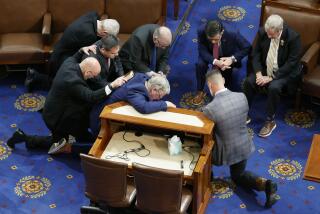Cal Thomas on Church and State
- Share via
* Cal Thomas sputters about the church-state split in his commentary of June 13 and decries the continuing secularization of our culture. I have news for Thomas--the framers of our nation’s founding documents were very clear that ours was to be a secular nation and that government should do nothing to establish any religion upon the people.
It is quite inappropriate, therefore, at a public high school graduation, for a Christian hymn to be sung. This is not a “Christian” nation--it is a nation which celebrates pluralism and includes people from many religious faiths as well as those who have no religious beliefs whatsoever.
Thomas Jefferson, who was a Deist, not a Christian, refers in his Declaration of Independence to a non-sectarian creator and to the “Laws of Nature and of Nature’s God.” Hardly the stuff of worship that the Christian right would like to impose on the rest of us.
RENEE KOGEL, Leader
Orange County Society for
Humanistic Judaism, Laguna Beach
* Thomas laments the “secularization of our culture,” and blames the “pagan left.” I suggest that next time he is looking for someone to blame, he do his homework before conjuring up the contemporary Pagan community as a scapegoat.
The word pagan most commonly refers to the pre-Christian religions of Europe, Northern Africa and the Middle East. Perhaps the most familiar is classical Greek “mythology,” but other pagan religions include the pre-Christian Norse, Celtic and Egyptian systems. Contemporary “neo-Pagans” have revived these ancient religions, emphasizing a close connection to nature, and rejecting the Christian duality of God/Satan for a concept more akin to the Eastern concept of yin/yang.
While modern Pagans are an eclectic group, they all certainly agree on the importance of the religious freedom guaranteed by the First Amendment. In addition, they are deeply religious people, who integrate their religious practice into their daily lives.
I suspect that Thomas’ real concern is not with the “secularization” of American culture, but with the fact that the dominant Christian majority is slowly losing its power to enforce religious conformity as American culture expands to encompass a larger, more diverse plurality of religious groups: Buddhists, Hindus, New-Agers, Muslims and, yes, even Pagans.
JENNIFER LYNN ORFF
Los Angeles
More to Read
Sign up for Essential California
The most important California stories and recommendations in your inbox every morning.
You may occasionally receive promotional content from the Los Angeles Times.










